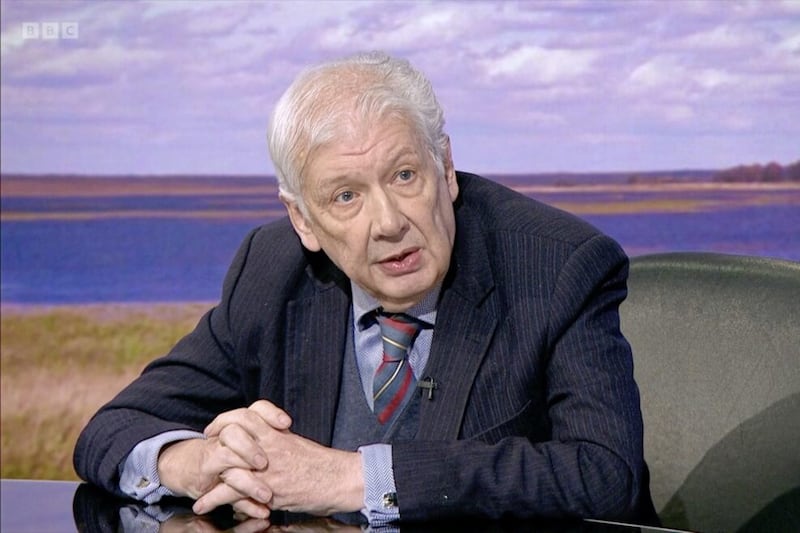The Windsor Framework has been formally adopted by the UK and EU. The deal was formally signed off after MPs voted through Rishi Sunak’s Brexit deal by an overwhelming majority.
While the vote was on a specific element of the framework, the Stormont brake, it was widely viewed as a proxy vote on parliament’s position on the wider arrangements. Eighty per cent of the Conservative Parliamentary Party voted for the framework.
Prior to the Westminster vote, the DUP had already announced that the party would vote against the revised proposals. Jeffrey Donaldson noted that real progress had been made but that there was a need for “further clarification”, some “reworking and change”, before a final decision could be made.
Following the vote, he tweeted “there is not a sustainable basis at this stage to enable us to restore Stormont”.
The DUP are in the rather strange position of being against every single permutation of a Brexit that they championed. Where do they go from here? And can this current impasse be resolved?
The Prime Minister has clearly decided it is time to move on with or without these intransigent unionists. He is determined to restore the UK’s reputation on the global stage and stabilise the economy.
The British public have had their fill of antagonism with the EU. The spectacle of the self-styled ERG 'star chamber' decreeing that the Stormont brake was “useless” was the theatre of the absurd. Fundamentally, their case was an argument against the very protocol that they previously concluded affirmed the sovereignty of the UK.
A bunch of attention seekers, cosplaying Second World War battles against an entirely fictional enemy, they are yesterday’s men, no longer able to muster enough support to mount a serious challenge within the Conservative party. Despite their bluster, in the end, only 22 of them rallied to support the DUP.
What precisely are the DUP hoping to achieve? The Windsor Framework will be implemented, so have they concluded that they have nothing to lose by rejecting it? Playing for time and stringing this out until after the local government elections in May appear to be the key objectives.
They have already calculated that playing tough and demanding additional concessions from Sunak will sit well with their electorate. However, Sir Jeffrey knows that he will never appease the hardliners in his party. The dithering and delay cannot continue indefinitely.
Ultimately, Donaldson hopes to find a way of not fully signing up to or endorsing what is proposed while simultaneously ending his boycott of Stormont. We have been here before. The DUP did not sign up to the Good Friday Agreement but were content to operate its structures.
Donaldson has been at pains to stress that the decision not to support the Stormont brake should not be viewed as an indication that the DUP have abandoned power-sharing. His eight-person panel which includes Peter Robinson and Arlene Foster is still consulting on the latest UK-EU proposals.
Their remit appears to have been extended to consider the future of unionism. On the one hand it is difficult to see how this panel can credibly decide in favour of the framework when the party have already voted against a fundamental tenet.
Sir Jeffrey has though insisted that they are not redundant and in fact are “more important than ever”. After more deliberation and delay can they give Donaldson the necessary political cover to return to devolved government by constructing a narrative that the difficulties presented by the Windsor Framework are best addressed within an Executive and Assembly? At a stretch he could even use their findings to argue that he should stay in Westminster and appoint a Deputy First Minister.
The DUP will return to power-sharing - it is a matter of when, not if. Devolution is the only show in town. The question is how long can this farce be allowed to persist? The Protocol deal has, however, put their holding pattern under pressure.
Meanwhile, the public in the north are condemned to continue in this political morass. Civil servants can keep the lights on but cannot make decisions to address pressing issues such as the budget deficit, the cost-of-living crisis, economic inactivity and the collapse of our health and social care system.
The loss of European Social Fund support will impact on our most vulnerable citizens, and compound the endemic problems associated with our fragile economy. Research this week by the Samaritans revealed that some of our children have started to self-harm as young as four years old. Treading water means sliding backwards and deepening discord. Make no mistake, this political vacuum would not be countenanced in any other region of the UK.
The north has dual market access and with this is a unique opportunity to attract investment and address longstanding structural issues. The DUP should not be allowed to shred this competitive advantage with their continued blocking of the restoration of devolution.
Civic society, business and the long-suffering public have grown weary of a minority being allowed to hamstring democratic government. If the DUP continue to boycott power-sharing, then the rules of engagement must be revised.
Will Sunak be content to play along with this indefinitely, or will he eventually bring the guillotine down? Who could have predicted that he would have been so ruthless and determined to get the ‘intractable’ protocol issue addressed? He has done so convincingly, facing down the Brexit ultras and Johnsonites. He now needs to show the same determination to ensure prosperity and stability in this benighted region.








